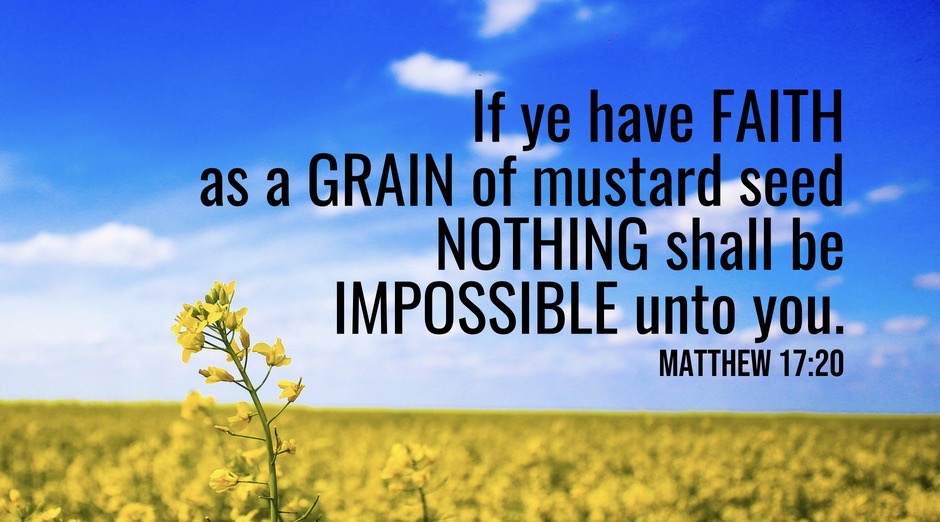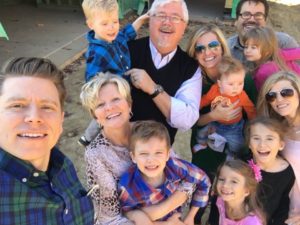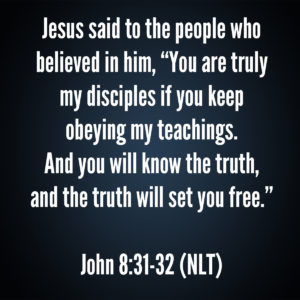
In the first article on Mustard Seed Faith I unpacked how the idea of the Mustard Seed was taught by Jesus as presented in the book of Matthew. There were three passages were Matthew let us know the context of how Jesus taught this topic and it had nothing to do with how most Christians view its focus.
If you ask the average believer what did Jesus teach on the Mustard Seed, most, if not all, would say it’s about having faith to move mountains in our lives. Yet in Matthew what Jesus actually spoke about was the context of moving mountains as it relates to casting out demons. The three passages Matthew wrote had to do with describing the “Kingdom of God“, “Casting out Demons” and having faith to “Forgive.”
It is important to know who Matthew was writing to, as the audience helps us understand why Matthew wrote the way he did. The Holy Spirit inspired all the writers of each of the four gospels, but we need to pay attention to who each writer was addressing. Matthew was focused on the Jewish convert believer, while the gospel of Mark was written and focused on the gentile convert. Luke’s gospel was written to an unsaved gentile whose name was Theophilus and John’s gospel was written to a mixed group. The context of each writer spoke to what was important to each audience even though it often was the same story or teaching.
So Matthew writes what Jesus taught on our Mustard Seed Faith by trying to explain to the Jewish mind how little and yet powerful our faith affects our ability to access God’s power. To the common every day Jew they were always put down by the ruling class of pharisees and sadducees as being too common and lowly to understand God let alone to hear when God was speaking. So often today pastors and teachers can have a condescending attitude towards their audience that makes the average person marvel at the teacher’s wisdom but not move them towards true application. Jesus, through this teaching on this topic, opened the Jewish person’s eyes to their “POTENTIAL” in moving in the power of God, even if their faith was small and their knowledge of scripture was limited.
The idea of the Kingdom of God is tied to the Mustard Seed Faith concept in which the Kingdom was the realm of trust a person had in God. The passage about casting out demons is again related to where our trust is positioned for moving in the spirit, not in our grasp of theology. Finally the power and need to forgive was linked to our trust in God or our lack thereof, and our management of that trust in our daily lives. As the mother of Jesus learned when becoming pregnant without having sex with a man “Nothing is Impossible With God.”
In Mark’s gospel only one passage is written on Mustard Seed Faith, and it revolves around the Kingdom, but with a broader perspective, namely its potential and design for “GROWTH.“ Mark was writing to the gentile understanding of faith and therefore the idea of the “POTENTIAL” value of faith was the most important concept to grasp.
Mark 4:30-32
Jesus asked, “How can I describe the Kingdom of God? What story should I use to illustrate it? It is like a tiny mustard seed. Though this is one of the smallest of seeds, it grows to become one of the largest of plants, with long branches where birds can come and find shelter.”
Mark shows to the gentile that Mustard Seed Faith should grow to help and support others. They didn’t have the problem the Jewish convert had but mainly it’s scope and purpose.
In Luke’s gospel he is addressing people who are not believer’s yet, but want history to substantiate Christ’s claim about himself and the kingdom of God. Luke focuses on the potential of faith and the power of faith. In particular Luke focuses on forgiveness. The apostle in Luke’s gospel almost complains about how hard forgiveness is, and thus they ask for Jesus to increase their faith. It is here that Jesus introduces the Mustard Seed illustration to bring home the idea that faith is not about having power but rather having trust in God.
Luke 17:3-6 Faith To Forgive
“Be on your guard! If your brother sins, rebuke him; and if he repents, forgive him. “And if he sins against you seven times a day, and returns to you seven times, saying, ‘I repent,’ forgive him.” The apostles said to the Lord, “Increase our faith!” And the Lord said, “If you had faith like a mustard seed, you would say to this mulberry tree, ‘Be uprooted and be planted in the sea;’ and it would obey you.
In the book of Acts, Peter and John are heading towards the temple to pray and see a lame man that had been there for years and yet at this particular day they sensed God was moving them to have FAITH that God could and would heal this man. The people witnessing this miracle attributed the lame man walking to Peter and John so Peter had to set the record straight that it wasn’t his big faith that healed the lame man but God working through them.
Acts 3:12
But when Peter saw this, he replied to the people; “Men of Israel, why are you amazed at this, or why do you gaze at us, as if by our own power or piety we had made him walk?”
Here is a truth we have to get straight in our own heads. There is no power in Faith but the power is in the Lord of whom we trust. There is a huge difference between the two idea. So many people that pray for healing of other try to build up their faith as if it were a thing of power rather than building up their faith to trust the God of power.
Here is another concept to grasp. “Faith is not Blind” but rather it is the belief and trust in the person we say we have faith in.The more we grasp who God is the more we should be able to trust him whether it’s for healing or direction in our lives. If our Mustard Seed Faith is growing we are growing in our awareness of God being trustworthy in our lives.
In this idea of faith being like a seed we need to remember the following:
- For a seed to grow it has to be in GOOD SOIL – Scripture relates to the soil as to our our hearts condition.
- For the seed to grow it must have enough WATER – Jesus talked about if he gave us his water we would never thirst and in fact water of life would flow out of us.
- For the seed to grow and thrive the soil must be FERTILIZED – This is the nutrition that helps unlock the seed’s potential. God’s word acts like the fertilizer to our soul.
- Finally, SUNLIGHT – Sunlight is the energy that seeds need to grow healthy and strong. The Psalms says “Your word is the light to my path.”
I trust your persecutive of Mustard Seed Faith is broadened and strengthened as you walk with God.
Questions:
1) Do you see that FAITH is trust in God and not some special power by itself without God. Have you tried to make faith grow or have you tried to know God better so your faith would grow?
2) Have you realized it doesn’t take much faith for God to move on our behalf? Can you trust God with what faith you have and believe God for growth in your faith?
Desiring to trust God with the faith I have and growing further into trusting him more.
Pastor Dale




Leave a Comment